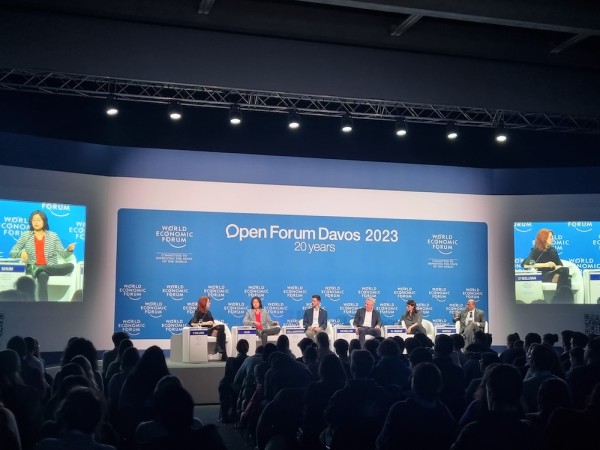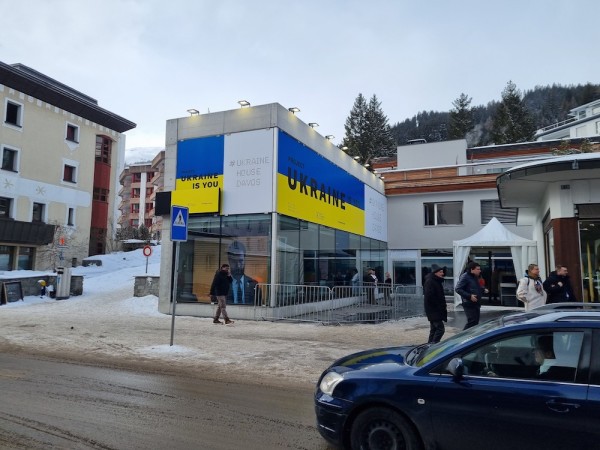VIDEO: On the ground in Davos for the World Economic Forum 2023
Over 2,500 global leaders gathered this week in the Swiss Alps to discuss climate change, sustainability, the war in Ukraine and the fourth industrial revolution
I admit that I’m a newbie to the World Economic Forum. This week I traveled to Davos, Switzerland to experience the conference first-hand and get a sense of what the WEF is all about. Prior to this week’s visit, my knowledge of the World Economic Forum (WEF) was limited to random articles and videos that friends had shared with me over the last three years since the start of the COVID pandemic.
As a reporter for ALL ISRAEL NEWS on the ground in Davos, my goals for attending the WEF were three-fold:
1) To discover who the decision makers from Israel are and whether Israel is more of a leader or a follower when it comes to WEF initiatives.
2) To understand the rollout plan for digital IDs and if/when Israel will adopt digital IDs.
3) To learn about central bank cryptocurrencies and if/when the Central Bank of Israel will launch a government-backed crypto shekel.
A short visit to Davos – located in the Swiss Alps – did not allow me to answer all of these questions, but the ALL ISRAEL NEWS team and I will be continue to track these topics and new developments.
The WEF Annual Meeting, intended for government leaders and top business leaders, is by invitation-only and was attended by over 2,500 people this year. My colleague, Jacob Rosenberg, and I attended the WEF Open Forum, which was free and open to the public. Surprisingly, the number of attendees at the Open Forum was smaller than I anticipated. The audience size ranged from an estimated 150 to 300 people, and included a significant number of young people. I honestly expected more people to attend the Open Forum since it was the only event on the WEF website that offered free registration to the public.

The main topics of discussion at the Open Forum were the climate, food and energy crises. During the sessions, there was a combination of optimism and despair expressed by WEF panelists. On the one hand, most of the panelists were optimistic that solving the climate, food and energy crises is, in fact, achievable. The prevailing thought was that with more technological advances, more climate-friendly behaviors and more investment in climate change initiatives, we can make the world a better place. On the other hand, the WEF panelists spoke about impending doomsday climate scenarios, predicted
by computer forecasting models, which have caused widespread “eco-anxiety” among many youth around the world.
The “exhibition booths” at the WEF were not your typical displays inside large exhibition halls. In fact, there were not any large exhibition halls at all. Instead, the main shopping street in Davos, known as the Promenade, served as the exposition center. Major corporations and countries took over shops and restaurants, remodeled them, and set up exhibitions and meeting rooms for WEF attendees.
I was surprised that most "exhibits" were used for private meetings or hosting cocktail parties, rather than displaying their products and services. For example, at Meta's exhibit (formerly known as Facebook), I expected to see the latest virtual reality and metaverse platform, but instead, it served only as a mingling space.
Other big-tech companies with a presence on the Promenade were Amazon, IBM, Cisco, Zoom, Intel, Uber and Qualcomm. Notably absent were Twitter, Apple, Microsoft and Google, although my guess is that they had representatives attending the WEF Annual Meeting.
From the financial world, WEF exhibitors Blackrock, Citibank, Dow Jones, UBS and Credit Suisse could be found on the Promenade. However, JPMorgan and Goldman Sachs did not have a presence.
In the crypto space, the main exhibitors were Circle (USDC stable coin) and Hedera, as well as a Blockchain Hub, which hosted several panel discussions. Only one professional sports club, Manchester United, occupied a storefront on the Promenade.

Regarding representation from the media space, WEF exhibitors were CNBC, Reuters, Wall Street Journal and Axios. Surprisingly, I did not see any mainstream media reporting on the Promenade. Maybe they were inside the secure area of the WEF Annual Meeting. The media presence that I did notice were Michael Knowles of the Daily Wire, Ezra Levant and Avi Yemini of Rebel News, a Polish News TV channel, and several independent journalists: Calvin Robinson from the U.K., Savanah Hernandez from the U.S., and Masako Ganaha from Japan, who attempted to interview the founder of the WEF. In addition, popular YouTube star and Israeli-born Nuseir Yassin of Nas Daily was in Davos. Yassin moderated a panel at the Open Forum entitled Propelling Planetary Prosperity.
I was also surprised to learn this week that WEF founder Klaus Schwab considers former Israeli Prime Minister and President Shimon Peres, to be one of his mentors.
Jacob and I visited a restaurant on the Promenade with a “special” menu for WEF 2023. We, along with other participants at the WEF, paid at least double the normal price. On the flip side, we were blessed to be hosted in Davos by local Swiss Christians who live within walking distance of the forum. Hotel rates during the week of WEF were increased to several thousands of dollars per night.
In the weeks and months to come, the ALL ISRAEL NEWS team will continue to track the initiatives of the WEF and educate our Evangelical Christian readers from around the world based on what we learn, and to answer the broader question: Is the WEF a worthwhile non-profit organization whose stated mission is "to make the world a better place" or is it an international para-government organization with ulterior motives?

Joseph Magen is Co-Founder of ALL ISRAEL NEWS. He has more than 20 years of experience in high-tech, software development, real esate, and venture capital. Joseph lives in central Israel with his wife and five young children.













